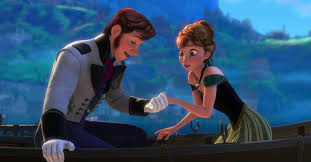The Disney hit is a good, subversive kids' film—until a needlessly jarring surprise at the end.
After I saw Frozen last week, I texted my best friend. Per her request, I sent her a list of the elements that her kids (ages seven, five, and three) might find scary: Rampaging snow monster, heroine freezing into solid ice, seemingly noble prince who turns out to be evil.
My friend quickly texted back to say that the prince sounded scariest of all. And she was right.
In Frozen, our heroine Princess Anna embarks on a quest to bring back her sister, Elsa, who has run away after inadvertently revealing her magical, winter-creating powers. Elsa accidentally strikes Anna with a shard of ice that pierces her heart; Anna believes that a kiss from the charming Prince Hans, whom she thinks is her true love, will save her from death. But just when he should be saving the princess, the male lead reveals himself to be a greedy, throne-usurping would-be killer: Hans leans in, supposedly about to give her that kiss ... then sneers, “Oh, Anna, if only there were someone who loved you.”
Ouch. That moment would have wrecked me if I’d seen it as a child, and the makers of Frozen couldn’t have picked a more surefire way to unsettle its young audience members.
It’s not like Disney has never given us heartbreaking moments before. (Bambi’s mother, anyone?) And it’s not that there’s no purpose behind the film’s cruel twist, either: The naïve and lonely Anna has fallen in love with and become engaged to Hans in the course of just one day. As her other love interest, Kristoff, tells her, this is not exactly indicative of good judgment.
However, there is something uniquely horrifying about finding out that a person—even a fictional person—who’s won you over is, in fact, rotten to the core. And it’s that much more traumatizing when you’re six or seven years old. Children will, in their lifetimes, necessarily learn that not everyone who looks or seems trustworthy is trustworthy—but Frozen’s big twist is a needlessly upsetting way to teach that lesson.
Before the shattering reveal takes place, the audience has already enjoyed more than an hour of Hans’s niceness. He’s kind to people and animals; he saves Anna’s sister, Elsa, from being killed; he even offers free winter cloaks and soup to the poor.
More here VIA The Atlantic

